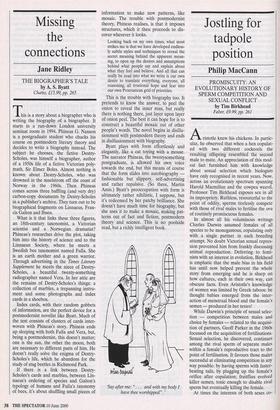Jostling for tadpole position
Philip MacCann
PROMISCUITY: AN EVOLUTIONARY HISTORY OF SPERM COMPETITION AND SEXUAL CONFLICT by Tim Birkhead Faber, £9.99, pp. 261 Aristotle knew his chickens. In partic- ular, he observed that when a hen copulat- ed with two different cockerels the resulting offspring resembled the second male to mate. An appreciation of this mod- est fact furnished him with knowledge about sexual selection which biologists have only recognised in recent years. Now, across an evolutionary spectrum spanning Harold Macmillan and the cowpea weevil, Professor Tim Birkhead exposes sex in all its impropriety. Ruthless, resourceful to the point of oddity, sperms tirelessly compete with those of rival males to fertilise the ova of routinely promiscuous females.
In almost all his voluminous writings Charles Darwin assumed females of all species to be monogamous, copulating only with a single partner in each breeding attempt. No doubt Victorian sexual repres- sion prevented him from frankly discussing animal reproduction. Deferring to femi- nists with an interest in evolution, Birkhead is emphatic that the male bias in his field has until now helped prevent the whole story from emerging and he is sharp on how cultures, each in their own way, can obscure facts. Even Aristotle's knowledge of women was limited by Greek taboos: he thought babies emerged from the inter- action of menstrual blood and the female's semen — produced in her testes!
While Darwin's principle of sexual selec- tion — competition between males and choice by females — related to the acquisi- tion of partners, Geoff Parker in the 1960s focussed on the acquisition of fertilisations. Sexual selection, he discovered, continues among the rival sperm of separate males within a female's reproductive tract to the point of fertilisation. It favours those males successful at eliminating competition in any way possible: by having sperms with faster- beating tails, by plugging up the female's orifice after copulation; fruitflies evolved killer semen, toxic enough to disable rival sperm but eventually killing the female.
At times the interests of both sexes co- incide, producing the illusion of co-opera- tion and the marriage appears to be made in Heaven. Witness worms who, upon meeting, fuse at the head for life. But more manifest is inherent sexual conflict, a ruth- less battle of the sexes to secure for each individual 'the best, selfish genetic deal'. The female hyena has found a way to wrest sexual control from the male by evolving an unaccommodating pseudo-penis through which she copulates, urinates, and gives birth.
Like Richard Dawkins in the field of gene competition, Birkhead has gathered the arresting discoveries in sperm competi- tion into a gripping popular narrative, alive with humour and anecdote. The impression is of animal evolution explained by one pet theory. If this is another male biologist lec- turing females about their bodies, at least he favours the counter-adaptation of a new cultural bias towards them. Are there limi- tations here too? To what extent females compete for males, whether poor old ova have to compete in different individuals for receptivity of sperm, we don't find out. Birkhead is careful only to speculate about post-copulatory female choice of ejacu- lates. The phenomenon may be little more than genetic compatibility expressed in the emotive language of female power. His admission is useful: 'so much more is known about ejaculates than ova. This is partly because ejaculates are inherently easier to study.'
The paradigm shift in evolutionary biolo- gy in the Sixties dragged us kicking and screaming towards ultra-Darwinian ortho- doxy with all its implications of ruthless selfishness. Appeals to meaning or altruism crumbled before the remorseless argu- ments of George Williams and E. 0. Wil- son (popularised gloriously by Dawkins in The Selfish Gene). Accidental errors in DNA replication produced a gene for love which survives because it helps us, its host organisms, to compete in reproduction. Chaos was everywhere. 'Gone is purpose,' wrote Peter Atkins in 1984. 'This is the bleakness we have to accept.'
Reductionism? Arrogance? So say the new biologists who emphasise the freedom of living organisms. Wherever you stand on nature vs nurture, Promiscuity is an edifying summary of the latest discoveries in a sub- ject of the most profound interest to us.

































































 Previous page
Previous page